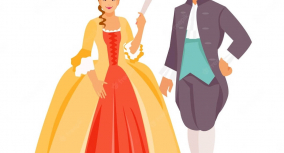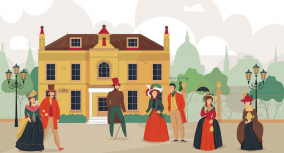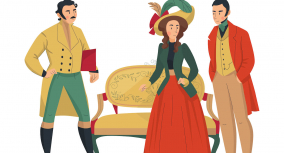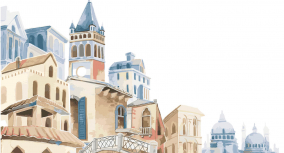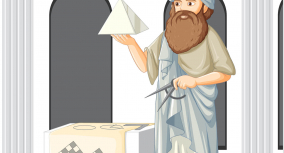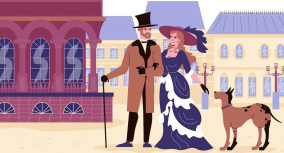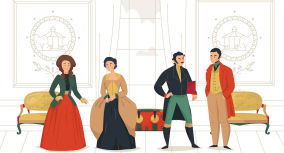What is the main message in Candide? Voltaire disagreed with the norms and ideas prevailing in the philosophy of his era. He veiled his contrary opinion in humor and satire. His young and innocent character gradually becomes a practical and thoughtful man. The reader follows this dynamical transformation.
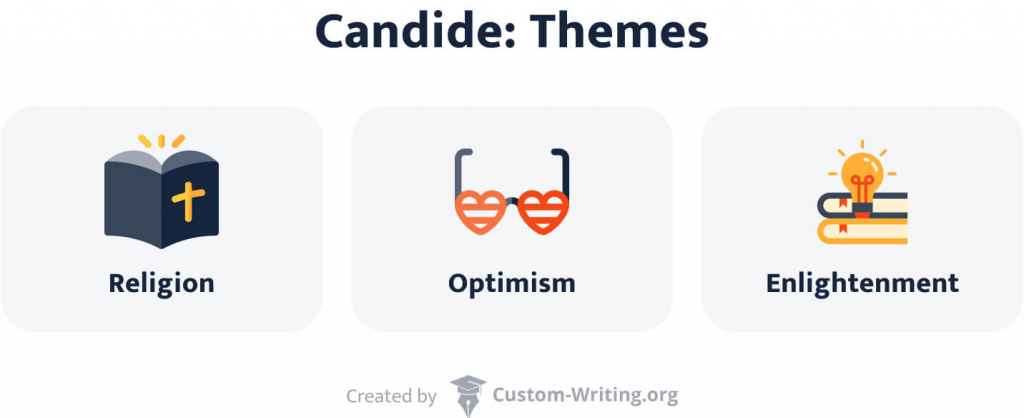
By the end of the book, we are ready to understand why the Dervish and the Farmer make Candide reject everything he used to believe. This world is neither good nor bad, and it does not care about people. The only way to make our existence pleasurable is to work and enjoy the fruits of our toil.
The main idea of the book reflects in the themes of religious hypocrisy, philosophical optimism, and Enlightenment.
Want to learn more about the themes in Candide? You’re in the right place! All the key Candide themes are described in this article prepared by our experts.
🙏 Religion in Candide
There are many religious figures in the novel, but none of them is genuinely religious.
The Anabaptist is kind and caring. He drowns himself, trying to save a stranger. Still, he leads dishonest business, selling homemade rags as exotic souvenirs.
After the earthquake destroyed three-fourths of Lisbon, the religious sages conclude that burning several people on slow fire is “an infallible secret to hinder the earth from quaking.”
A Protestant orator delivers a lengthy speech on charity. But when hungry Candide approaches him for alms, the orator asks the protagonist to call the Pope an Anti-Christ. Otherwise, he will not give any food.
Young church singers are castrated to preserve their voice. The need for beautiful religious chants vindicates such cruelty.
The citizens of El Dorado, the earthy heaven, are surprised by Candide’s questions about religion. They allow their people to believe in as many Gods as they want and never make it an issue of discord.
For Voltaire, religion does not make people more moral. It is a good excuse for aggression and the elimination of enemies. Priests and abbes observe only the Christian dogmas they want, ignoring the rule to renounce worldly life. Religion gives them power, which they readily abuse.
Religious Hypocrisy
In Candide, we find endless examples of religious doublethink. Here are some of them:
- The war between the Bulgars and Abars takes many human lives. In the course of the conflict, the Baron’s castle is destroyed. Still, both kings make their people sing “Te Deum” in honor of God. Both sides consider that God helped them.
- The Muslim military men kill and rape people of other faiths. But they never fail to read the five daily prayers prescribed by their faith.
- Candide kills the Grand Inquisitor and Don Issachar. The former is honored in a pompous funeral. The latter is thrown into the sewer, as he was a Jew.
- People are executed in auto-da-fé for some ridiculous reasons. A Jew refused to eat bacon, and a man married his godchild’s grandmother. The Grand Inquisitor threatened to burn Don Issachar for not selling him Cunégonde.
In the novel, people prefer to observe the rites and traditions of their religions, ignoring the postulate “to love thy neighbor.” It represents the essence of Religious Hypocrisy.
Quotes on Religion in Candide
The orator’s wife, putting her head out of the window, and spying a man that doubted whether the Pope was Anti-Christ, poured over him a full…. Oh, heavens! to what excess does religious zeal carry the ladies.
Candide, Narrator, Chapter III
At last my Jew, intimidated, concluded a bargain, by which the house and myself should belong to both in common; the Jew should have for himself Monday, Wednesday, and Saturday, and the Inquisitor should have the rest of the week… Quarrels have not been wanting, for they could not decide whether the night from Saturday to Sunday belonged to the old law or to the new.
Candide, Cunegonde, Chapter VIII
Good God! I have killed my old master, my friend, my brother-in-law! I am the best-natured creature in the world, and yet I have already killed three men, and of these three two were priests.
Candide, Candide, Chapter XV
We do not pray to Him, we have nothing to ask of Him; He has given us all we need, and we return Him thanks without ceasing.
Candide, Old Man, Chapter XVIII
I own to you that when I cast an eye on this globe, or rather on this little ball, I cannot help thinking that God has abandoned it to some malignant being.
Candide, Martin, Chapter XX
🎈 Optimism in Candide
According to Voltaire, optimism is a foolish way to put a brave face on a sorry business. The most confirmed optimist in his novel, Pangloss, is good for nothing but talking. When his disciple is in pain and asks for help, Pangloss starts pondering the cause-and-effect relations of such circumstances. By the end of the story, he is “in despair at not shining in some German university.” His optimism did not help him achieve his goals. But hard work could do so.
But as the novel teaches us, mere search for the good side of things cannot remedy any hardship. It makes a person blind and helpless. Candide transforms from an optimist to a realist, but this development does not make him happier. He becomes a firmly established and pro-active man who did everything possible to achieve his aim. Candid succeeded, but the purpose turned out to be less impressive than he had thought. Now he has to be content with his life and work hard in the garden to make it sufficiently tolerable.
Philosophical Optimism in Candide
“Optimism” is the subtitle of Voltaire’s novel. In such a way, the author tells us that although he raises multiple social and cultural problems, optimism is what he wants to discuss. And as far as the work of fiction is a satire, Voltaire’s purpose was to ridicule the new philosophy advocated by Gottfried Wilhelm Leibniz and his successors. Besides, Leibniz created the word “optimisme” in 1739, and Candide appeared in print only 22 years later.
Throughout the novel, two philosophers accompany Candide. Pangloss, the partisan of optimism, was Candide’s first teacher. Martin, the adherer of pessimism, joins Candide when the protagonist becomes prepared to question his views. The former claims that we live in the best of possible worlds, while the latter sees only its negative aspects. As the author shows us, both opponents are wrong.
Quotes on Optimism in Candide
He proved admirably that there is no effect without a cause, and that, in this best of all possible worlds, the Baron’s castle was the most magnificent of castles, and his lady the best of all possible Baronesses.
Candide, Narrator, Chapter I
There can be no effect without a cause, the whole is necessarily concatenated and arranged for the best. It was necessary for me to have been banished from the presence of Miss Cunegonde, to have afterwards run the gauntlet, and now it is necessary I should beg my bread until I learn to earn it; all this cannot be otherwise.
Candide, Candide, Chapter III
We are going into another world, and surely it must be there that all is for the best. For I must confess there is reason to complain a little of what passeth in our world in regard to both natural and moral philosophy.
Candide, Candide, Chapter X
[Optimism] is the madness of maintaining that everything is right when it is wrong.
Candide, Candide, Chapter XIX
There is a concatenation of events in this best of all possible worlds: for if you had not been kicked out of a magnificent castle for love of Miss Cunegonde: if you had not been put into the Inquisition: if you had not walked over America: if you had not stabbed the Baron: if you had not lost all your sheep from the fine country of El Dorado: you would not be here eating preserved citrons and pistachio-nuts.
Candide, Pangloss, Chapter XXX
📖 The Ideas of Enlightenment in Candide
The intellectual movement of the Enlightenment flourished in 17th and 18th century Europe. Its ideas emphasized individualism and critical thinking as opposed to tradition. Also known as the “Age of Reason,” it brought the humankind to adulthood (as Immanuel Kant symbolically described it). This movement aimed to liberate the public consciousness from ignorance and religious hypocrisy.
Candide instantly became a best-seller because of its topical issues. Twenty thousand books were sold during the first month after publication. The novel satirizes almost every social construct of the era. The aristocracy, army, church, marriage, money, and nationalism reveal their negative meaning through the characters’ actions.
El Dorado represents the dream state for Voltaire. Its countrymen did not observe any religious rites. They had no prosecution system, and unlimited money did not spoil them. The Enlightenment aimed to step aside from the traditional perception of society and create a better and more reasonable world of educated people.
All people are equal and require equal treatment. Ethnic and religious wars never bring any good even for their winners. Only those rulers who treat their subordinates with respect can prosper in the long run. It was the essential idea that manifests itself in Candide through the Enlightenment.
Thank you for reading this article! You might also want to take a look at Candide essay topics collection. And if you need to make the text of your essay more colorful, try our paraphrasing tool. Any questions left? Check the QA section!
